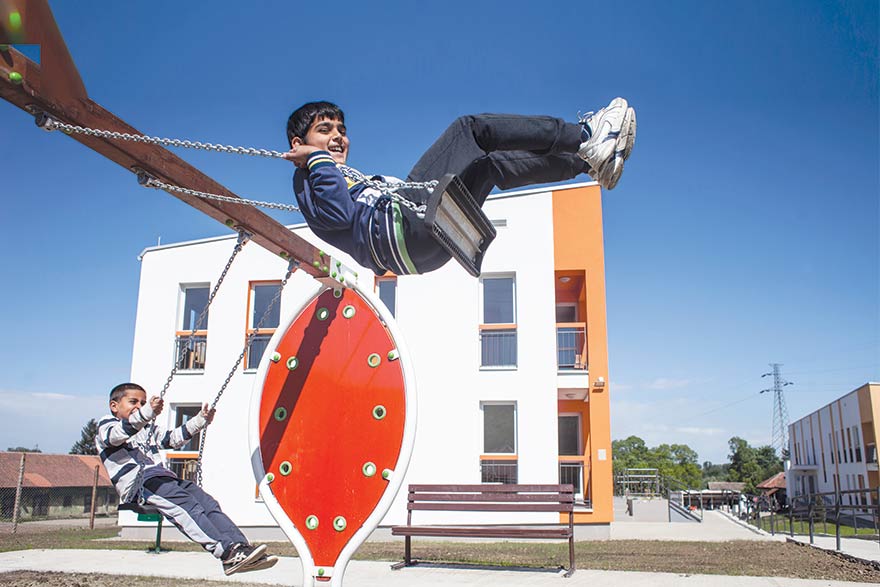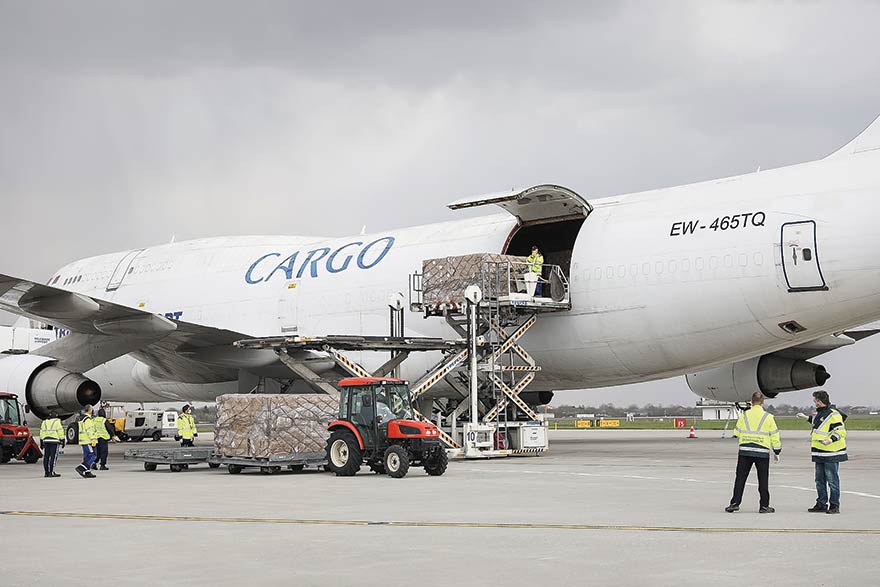Our support for Serbia’s response to COVID-19 is continuing today, thanks to EU funds to support the hiring of 200 medical professionals working in hospitals and laboratories across Serbia. As the United Nations Agency with a mandate on procurement, we remain ready to support the Government of Serbia in its challenging response to COVID-19
UNOPS – the United Nations Office for Project Services has been active in Serbia since the year 2000, while the operations of the UNOPS Serbia Office have expanded to encompass North Macedonia and Montenegro since 2017. This UNOPS Office has been a reliable partner – initially to the Government of Serbia, and later to the governments of North Macedonia and Montenegro – in providing support for socio-economic reforms and easing accession to the European Union. It has also supported these countries in responding to major crises, such as the floods that hit Serbia in 2014, or the COVID-19 pandemic that is still challenging the region.
In cooperation with the European Union and with funding from the EU, the Kingdom of Norway, the donor governments of Switzerland and Sweden and other national governments, as well as UN agencies, the UNOPS Serbia Office implements 14 projects focused on sustainable socio-economic development, social cohesion, housing, employability, business growth, security, healthcare and education, as well as emergency response.
All projects are implemented within the mandate on project management, infrastructure, procurement, HR and financial management, while good governance, gender equality and care for the most vulnerable are transversal spheres of all initiatives included.
When UNOPS started working in Serbia 20 years ago, it was a new United Nations agency that had only started receiving funding five years prior, in 1995. What are its main characteristics and the values of this organisation today?
UNOPS was founded with the mission to support people in building better lives and support countries in achieving sustainable development. It is a unique United Nations agency in many aspects: it is the only agency within the UN system to be completely demand-based, as it focuses on partners’ demands and the needs of countries. This means that it does not receive core funding, but rather operates to ensure its own financial self-reliance. This is not just its modus operandi, but also defines its organisational culture, structure, values; it is its DNA.

Headquartered in Copenhagen, UNOPS is a decentralised agency working in more than 80 countries, employing 13,000 people along an operational spectrum from development to humanitarian issues, peace and the security sector.
It is also an eclectic organisation, where private sector jargon is commonly used and applied in framing the strategic substratum of the organisation from business plans to risks analyses, from donor visibility requirements to project monitoring. However, UNOPS is also anchored in the United Nations’ values, guidance and responsibilities.
There is a wealth of expertise within the UNOPS offices, and my wish is to be able to take this expertise outside of these walls and support people in need and improve their lives. This is what UNOPS is about: a better life for all
In this regard, UNOPS also differs from other UN agencies in that it does not have a mandate in a functional sector, such as health, or a target population. UNOPS’ core mandate covers infrastructure, procurement, project management, human resources and financial management services.
These pillars allow UNOPS to be able to offer its expertise in a vast array of areas and to various stakeholders, while fulfilling international standards. UNOPS has been awarded global project management certificates; it has achieved the gold level in the Sustainable Procurement Review by the Chartered Institute of Procurement and Supply (CIPS); in the domain of infrastructure UNOPS collaborates with several universities and international federations of experts, in order to guarantee the application of international best practices.

I also see the uniqueness of UNOPS in terms of its organisational culture, which is conceptualised as the values that support the narrative of the organisation in terms of excellence, accountability, transparency and operational relationships with donor and recipient governments.
All this, and much more, constitutes the UNOPS identity.
UNOPS is a project-based United Nations agency that receives funding from various donors to implement a diverse portfolio of projects. What are your areas of expertise and why is UNOPS chosen as a preferred implementing partner?
We focus on the implementation of projects; we design context-specific projects in response to countries’ needs and seek collaborative partnerships with other United Nation agencies, local organisations, national governments and local governments.
What we want with our projects is to make a tangible impact for people. We do this by expanding the implementation capacity of the government, the United Nations and other partners, and we support the country in achieving the Sustainable Development Agenda. We manage a vast portfolio of projects, from infrastructure to procurement, from sustaining small businesses to enhancing local governance, providing technical advice to the government in building clinical centres, supporting environmental projects and responding to national emergencies.
UNOPS projects are contextualised within the broader Sustainable Development Goals framework and objectives, as well as national strategies and priorities
UNOPS in Serbia has offices in Belgrade, Niš, Novi Pazar and Vranje. What is the strength of your organisation?
The biggest strength is our people: we have a wonderful team of 100 dedicated people working at four offices in Serbia, and also offices in North Macedonia and Montenegro. They bring with them a wealth of expertise in the private and public sectors, academia and civil society. They are highly skilled and certified professionals who are able to implement complex projects and manage stakeholders at different levels. There is a need for capacity building in Serbia, and through our projects we apply international standards of excellence and share our expertise.
Having skilled people, understanding the context and having international certifications of excellence is not enough without commitment, hard work and professional integrity. And this makes the difference, with the commitment of the team ensuring that beneficiaries improve their quality of life and that donors’ taxpayer contributions are spent meaningfully. I would like to thank my team for all of this. This commitment is part of our UNOPS identity.
Serbia, like the rest of Europe, was hit severely by heavy flooding in 2014, causing damage to people’s homes, roads and public buildings, and leading to people losing their lives. Was UNOPS able to provide any tangible support to the country during that emergency? UNOPS was one of the key partners of the Government of Serbia and donor governments, such as the EU, Kingdom of Norway, United Kingdom, France and Canada, in implementing the emergency response in 2014, implementing projects with a total value of 22 million euros.
Interventions included constructing nearly 100 new houses and reconstructing over 300, renovating almost 40 public facilities in education, healthcare and culture, constructing 12 kilometres of roads with dozens of landslides, rehabilitating nine existing bridged and constructing five new ones, as well as restoring 20 river embankments. UNOPS also assisted the Government of Serbia in improving the national disaster prevention and response system and establishing the Office for Flood Affected Areas Assistance and Rehabilitation, to be later transformed into the Public Investment Management Office.
We are living in the global COVID-19 pandemic that challenges the capacities of our healthcare system and economy, and impacts the most vulnerable sections of the population in particular. What is UNOPS doing in Serbia to support the people during these difficult times?
In this pandemic, solidarity is equally as important as effectiveness, and this is an orchestrated effort of all actors in all nations. Of course, the United Nations plays an important role, with each Agency mobilising its own expertise.
With the recognition of the COVID-19 pandemic by the World Health Organization in March 2020, UNOPS activated its Emergency Procurement Procedures globally, in order to enable a faster response. Medical and personal protection equipment were the most demanded items globally, and with the shortfalls between demand and supply coupled with numerous bans on transportation and export, the market was severely disrupted and procurement became extremely challenging.
We nonetheless managed to procure medical and non-medical items worth 11.5 million euros, which were required not only by the Government of Serbia, but also in North Macedonia and Montenegro, where we also have offices, thanks to funding from the European Union and the Kingdom of Norway, and in coordination with the UN Country Teams. The strength of our response was our capacity to implement a multi-pronged strategy that included simultaneous dialogues with governments to understand their needs, the mobilisation of donors, agility in applying the quickest technical instruments to make funds available, market research and contacts with suppliers, so that we could launch our response plans successfully within days.
You have been heading UNOPS in Serbia for more than two years now. What are your impressions of the country?
When I arrived here I knew that I was going to lead a dynamic and diversified office, a team with a history and a strong sense of purpose. I was impressed to see not just the capacity, but the willingness of the team to work hard to respond to the needs of the people with meaningful projects. The office has expanded in the region in the last two years, so we now have offices in Montenegro and North Macedonia, with projects linked to economic development, infrastructure and environment. The commitment of the team is not only national, rather it has become regional.
After 20 years in the country, what is your vision for the future of UNOPS in Serbia?
I head an office that has achieved a robust level of maturity in terms of project implementation capacity, contextual knowledge and operational relations with the government and donor countries. My vision is to maximise the capacity of this office fully, and to ensure stronger implementation synergy between donor states and the government in areas such as infrastructure, environment, procurement and project management.
We saw, for instance, during spring, when the COVID-19 epidemic started to hit Serbia, how fundamental public procurement was, and we succeeded in that; donors’ support was mobilised and we assisted the government in procuring medical and non-medical items, which was a lifesaving procurement.